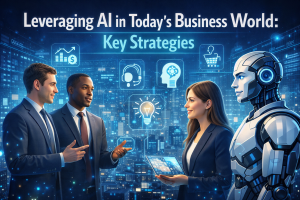Table of Contents
Artificial intelligence is reshaping industries at an unprecedented pace. While large corporations were early adopters, small businesses now have equal access to powerful technology. Recent IBM data shows 35% of companies use AI significantly, with adoption rates climbing 64% since 2021.
Cloud computing has democratized these tools, making them affordable and scalable. Case studies reveal impressive results—McKinsey documented 70% automation in inventory management, while Accenture achieved 95% demand prediction accuracy.
Sybill’s research confirms tangible benefits, with 92.1% of firms reporting measurable ROI. However, rapid growth brings challenges. Resource constraints require careful planning to maximize impact while maintaining operational flexibility.
The Evolution of AI Adoption in Small Business
Once reserved for tech giants, powerful solutions now empower smaller enterprises. Cloud platforms like AWS and Google Cloud have slashed upfront costs, replacing $250k+ systems with $99/month SaaS models. This shift lets businesses scale resources on demand.
From Exclusive to Accessible: The Democratization of AI
Tools like HubSpot’s AI suite support 200k+ clients, proving small business viability. Free options—Google Workspace AI, Canva—further lower barriers. Dylan Sellberg notes, “Upskilling teams remains critical to bridge knowledge gaps.”
Current Adoption Rates and Trends
25% of SMBs already use artificial intelligence, per Orion Policy Institute. Retail leads in automation, while professional services focus on AI software for client analytics. Ethical concerns, like Amazon’s biased algorithm case, remind users to audit outputs.
How Will AI Affect Small Businesses? Boosting Efficiency and Productivity
Time-consuming tasks now take minutes with intelligent automation solutions. McKinsey reports a 40% productivity boost when teams delegate repetitive work to machines. Legal firms, for example, draft contracts 3x faster using tools like Clio.

Automating Routine Tasks
Repetitive tasks like data entry or inventory tracking drain resources. A Brooklyn bakery automated 70% of stock management, reducing waste by 20%. Similarly, PwC found AI schedulers cut meeting setup time by 50%.
Fireflies.ai transcribes calls with 99% accuracy, freeing hours for strategic work. These gains compound—AI-powered efficiency lets small teams compete like corporations.
Case Studies: Real-World Impact
A Chicago law firm slashed document review time from 8 hours to 90 minutes. Meanwhile, AI bookkeeping tools like QuickBooks Online cut accounting costs by 30% versus traditional methods.
ROI timelines surprise many. Businesses under $1M revenue recoup AI investments in 6-9 months. Chatbots alone deflect 35% of service tickets, letting staff focus on complex queries.
Enhancing Customer Experience with AI
Modern shoppers demand instant, personalized interactions—now achievable at scale. Retailers using AI report 71% higher conversion rates, proving tailored experiences drive sales
24/7 Support with AI Chatbots
Chatbots handle 40% of retail service inquiries, slashing response times to seconds. ManyChat users resolve e-commerce queries 3x faster, while restaurant bots reduce phone staff by 30% without sacrificing satisfaction.
- Drift vs. Intercom: Drift excels in lead qualification, while Intercom’s AI integrates with CRM tools for seamless follow-ups.
- Multilingual support: DeepL and Google AI translation tools break language barriers, expanding market reach.
Personalization and Sentiment Analysis
Brandwatch’s sentiment analysis boosts loyalty programs, increasing retention by 22%. A clothing store’s recommendation engine lifted average order values by 18% using purchase history and browsing content.
“Ethical data usage builds trust—transparency in AI-driven decisions is non-negotiable.”
Balance automation with human oversight. Auditing algorithms prevents bias, ensuring customer relationships thrive long-term.
AI-Powered Marketing: Leveling the Playing Field
Personalized campaigns are now within reach for companies of all sizes. Advanced marketing tactics, once exclusive to enterprises, thrive with scalable technology. By 2025, 80% of retail firms will adopt these strategies, per Social Shepherd.

Targeted Advertising and Social Media
Platforms like Facebook Ads slash customer acquisition costs by 40% using AI targeting. TikTok’s algorithm outperforms manual bidding, while Phrasee boosts email CTR by 28%.
- Visual Content: Midjourney ($10–$30/month) suits custom designs, while Canva’s free tier offers templates for quick launches.
- Copywriting: Jasper excels in long-form content, whereas Copy.ai optimizes ad copy for social media.
Affordable Tools for Small Businesses
BrightLocal’s AI-driven local SEO tools help owners dominate neighborhood searches. Influencer matching algorithms cut partnership expenses by 60%.
“$5,000 agency retainers pale against $299 AI suites delivering comparable benefits.”
Mailchimp’s AI suggests subject lines, lifting open rates by 33%. These tools prove that innovation isn’t reserved for deep-pocketed companies.
Challenges of AI Adoption for Small Businesses
Adopting advanced tools presents unique hurdles for lean operations. While 25% of SMBs leverage automation, 60% cite cost barriers, and 77% face knowledge gaps. Balancing innovation with resource constraints requires strategic planning.

Cost and Resource Limitations
The average first-year investment reaches $15k, covering software, training, and infrastructure. Hidden expenses like API calls or data storage add up. For budget-conscious owners, HubSpot’s phased roadmap offers a scalable approach.
- In-house vs. Outsourced: Managing systems internally saves long-term fees but demands technical hires. Third-party vendors reduce upfront burdens.
- Upskilling: IBM’s 120-hour training benchmark highlights the support needed to bridge team competencies.
Data Privacy and Security Concerns
43% of firms fear breaches when handling sensitive data. GDPR compliance costs for EU-facing businesses climb 20% post-adoption. Cybersecurity insurance premiums rise accordingly, amplifying concerns.
“Small teams must audit vendors rigorously—encouraging transparency in data handling builds client trust.”
Bridging the Knowledge Gap
Orion Policy Institute notes 47% of SMBs need financial aid more than technical help. AI implementation hurdles often stem from limited CEO sponsorship (only 17% in SMBs vs. 83% in enterprises). Free resources like Google’s AI courses help democratize access.
The Future of AI in Small Business: Trends to Watch
Emerging technologies are redefining competitive landscapes for lean operations. With 90% prediction accuracy from validated systems like IBM Watson, data-driven management becomes accessible. Government programs and industry collaborations accelerate this development, creating new opportunities.

Predictive Analytics and Decision Support
Advanced tools now deliver 300% faster insights for critical choices. Healthcare providers use FDA-approved diagnostic assistants, while retailers optimize inventory with real-time demand forecasts. These solutions transform guesswork into strategic intelligence.
Vertical-specific applications are gaining traction. Contractors use job costing estimators, and accountants automate tax compliance checks. As noted in the Salesforce AI report, 76% of owners redirect saved time toward high-value work.
Collaborative and Government Initiatives
The US government allocated $1.7B in grants last year, with NSF SBIR awards averaging $256k. Microsoft’s mentorship program has trained 12,000 firms in responsible adoption. Such support structures lower entry barriers significantly.
- Standardization: NIST’s risk framework helps 68% of firms address customer trust concerns
- Specialization: Trade-specific interfaces emerge for electricians, landscapers, and therapists
- Verification: Blockchain integration ensures audit trails for automated decisions
Industry consortiums now focus on interoperability. Shared data pools let smaller players access enterprise-grade technology without massive investments. This collaborative approach fuels sustainable growth across sectors.
Conclusion
Innovation no longer favors deep-pocketed corporations alone. Small businesses achieve 82% efficiency gains with automation, closing gaps with larger rivals. Research confirms a 77% competitiveness boost for early adopters.
Hybrid human-machine workflows maximize benefits while mitigating risks like biased outputs. By 2026, most firms will hit ROI breakpoints, making strategic adoption critical today.
Start with free tools—Google’s AI courses or Canva’s templates—to build literacy. The competitive edge belongs to those who act now, blending technology with human ingenuity.
FAQ
What are the key benefits of AI for small business owners?
Artificial intelligence helps improve efficiency, reduce costs, and enhance customer experiences. Tools like chatbots and automation streamline operations, while data-driven insights support smarter decision-making.
How can AI-powered marketing tools help small businesses compete?
Affordable AI solutions enable targeted advertising, social media optimization, and personalized content creation. These tools level the playing field against larger competitors with smaller budgets.
What are the biggest challenges when adopting AI?
Cost limitations, data security concerns, and a lack of technical expertise often slow adoption. However, user-friendly platforms and government support programs are making it easier to integrate.
Will AI replace human workers in small companies?
No—AI primarily handles repetitive tasks, freeing up time for owners and employees to focus on strategy, creativity, and customer relationships. It enhances productivity rather than eliminating jobs.
Which industries see the most immediate impact from AI?
Retail, hospitality, and professional services benefit from chatbots, inventory management, and marketing automation. However, nearly every sector can leverage AI for growth and savings.
How does AI improve customer service for small businesses?
Chatbots provide 24/7 support, while sentiment analysis helps tailor responses. Personalized recommendations and faster query resolution boost satisfaction and loyalty.
What future AI trends should small business owners watch?
Predictive analytics, voice search optimization, and AI-driven financial tools will gain traction. Collaborative initiatives and grants may also lower barriers to entry.









